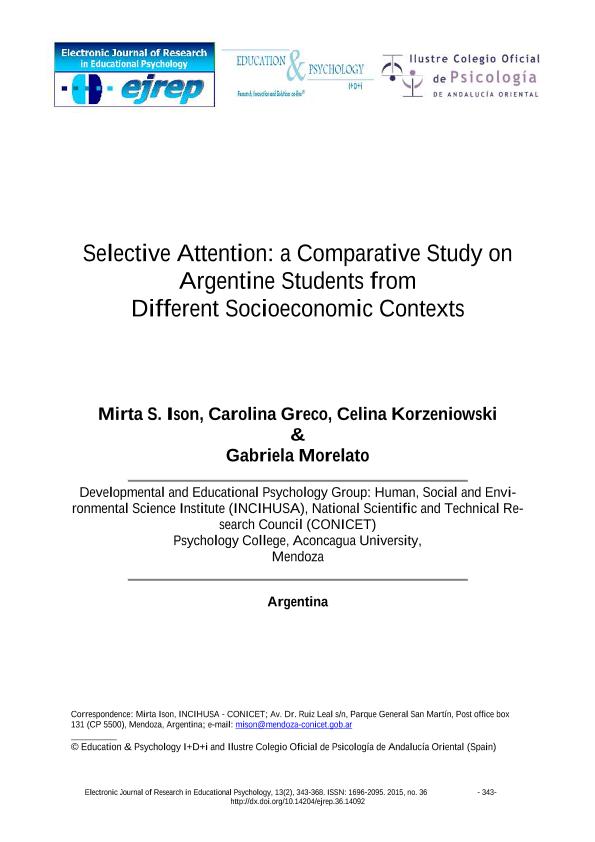Mostrar el registro sencillo del ítem
dc.contributor.author
Ison, Mirta Susana

dc.contributor.author
Greco, Carolina

dc.contributor.author
Korzeniowski, Celina Graciela

dc.contributor.author
Morelato, Gabriela Susana

dc.date.available
2017-05-12T21:51:10Z
dc.date.issued
2015-12
dc.identifier.citation
Ison, Mirta Susana; Greco, Carolina; Korzeniowski, Celina Graciela; Morelato, Gabriela Susana; Selective Attention: a Comparative Study on Argentine Students from Different Socioeconomic Contexts; Universidad de Almería a y Ilustre. Colegio Oficial de Psicología de Andalucía Oriental; Electronic Journal of Educational Psychology; 13; 2; 12-2015; 343-368
dc.identifier.issn
1696-2095
dc.identifier.uri
http://hdl.handle.net/11336/16447
dc.description.abstract
Attentional Efficiency (AE) is defined as the accuracy with which a child discriminates, from a group of similar stimuli, those which are identical to a model, within a certain time period. Various factors may be associated with a higher or lower AE, among which is socioeconomic context. The goals of this study were: 1) To describe argentine students' attentional efficiency according to the type of school (private-public), according to the students' age and gender and according to the educational and occupational level of the students' mothers; 2) To compare attentional efficiency according to the type of school (private-public), students' age and gender and educational and occupational level of their mothers. Method: A comparative cross-sectional study was used. Two groups of 10-to-13-year-old students were formed: 74 from public schools (Mean 11.26; S.D. 0.93; 53% boys and 47% girls) and 67 students (Mean 11.49; S.D. 1.05; 54% boys and 46% girls) from a private schools. Type of school is categorized by Mendoza general Board of Education. Private schools are located in urban areas. Public schools are situated in peripheral areas in contexts of social vulnerability. Social vulnerability is a condition of social risk that hinders, either immediately or in the long term, the satisfaction of welfare needs, both in terms of survival and quality of life. In this kind of contexts there are lower levels of education in the families, poor working conditions and/or unemployment, families dysfunction and poor mother and child health services. All of these situations lead to unequal social conditions and decreasing opportunities for children's development. There are 10 public schools in peripheral areas and 25 private schools in urban areas at Guaymallen, Mendoza. The participants were from two schools, one from public and other from private school. Results: The results revealed lower attentional efficiency in school children attending public schools than in those attending a private schools. No statistically-significant differences were observed in attentional efficiency in relation to the gender or age of the participating children. The students whose mothers had attained a university level of education showed a significantly higher attentional performance, in contrast with those students whose mothers had only attended primary school. In addition, the students whose mothers were employed showed a significantly higher attentional performance in contrast with those children whose mothers were unemployed. Nevertheless, no statistically-significant differences were observed in attentional efficiency in relation to occupational level of qualification of students' mothers. Conclusion: This study concurs with research showing the influence of socioeconomic context on children's attentional performance, contributing evidence on the need to adjust educational practices and cognitive interventions to boost children's academic achievements.
dc.description.abstract
La Eficacia Atencional (EA) es definida como la exactitud con la cual un niña/o discrimina estímulos iguales a un modelo, dentro de un conjunto de estímulos semejantes, en un tiempo determinado. Diversos factores pueden asociarse a una mayor o menor EA, entre ellos el contexto socieconomico. Los objetivos de este estudio fueron: 1) describir laeficacia atencional en escolares argentinos según el tipo de escuela a la cual asisten (privada-pública), según la edad y el género de los escolares y según el nivel educativo y ocupacional de las madres de los escolares; 2) comparar la eficacia atencional según el tipo de escuela (privada-pública), según la edad y el género de los escolares y según el nivel educativo y ocupacional de las madres de los escolares
dc.format
application/pdf
dc.language.iso
eng
dc.publisher
Universidad de Almería a y Ilustre. Colegio Oficial de Psicología de Andalucía Oriental
dc.rights
info:eu-repo/semantics/openAccess
dc.rights.uri
https://creativecommons.org/licenses/by-nc-sa/2.5/ar/
dc.subject
Attentional Efficiency
dc.subject
Socieconomic Context
dc.subject
Children
dc.subject
Schools
dc.subject.classification
Psicología

dc.subject.classification
Psicología

dc.subject.classification
CIENCIAS SOCIALES

dc.title
Selective Attention: a Comparative Study on Argentine Students from Different Socioeconomic Contexts
dc.title
Atención selectiva: un estudio comparativo sobre los estudiantes argentinos de diferentes contextos socioeconómicos
dc.type
info:eu-repo/semantics/article
dc.type
info:ar-repo/semantics/artículo
dc.type
info:eu-repo/semantics/publishedVersion
dc.date.updated
2017-05-09T18:03:38Z
dc.journal.volume
13
dc.journal.number
2
dc.journal.pagination
343-368
dc.journal.pais
España

dc.journal.ciudad
Almería
dc.description.fil
Fil: Ison, Mirta Susana. Universidad del Aconcagua. Facultad de Psicologia; Argentina. Consejo Nacional de Investigaciones Científicas y Técnicas. Centro Científico Tecnológico Conicet - Mendoza. Instituto de Ciencias Humanas, Sociales y Ambientales; Argentina
dc.description.fil
Fil: Greco, Carolina. Consejo Nacional de Investigaciones Científicas y Técnicas. Centro Científico Tecnológico Conicet - Mendoza. Instituto de Ciencias Humanas, Sociales y Ambientales; Argentina
dc.description.fil
Fil: Korzeniowski, Celina Graciela. Universidad del Aconcagua. Facultad de Psicologia; Argentina. Consejo Nacional de Investigaciones Científicas y Técnicas. Centro Científico Tecnológico Conicet - Mendoza. Instituto de Ciencias Humanas, Sociales y Ambientales; Argentina
dc.description.fil
Fil: Morelato, Gabriela Susana. Consejo Nacional de Investigaciones Científicas y Técnicas. Centro Científico Tecnológico Conicet - Mendoza. Instituto de Ciencias Humanas, Sociales y Ambientales; Argentina. Universidad del Aconcagua; Argentina
dc.journal.title
Electronic Journal of Educational Psychology
dc.relation.alternativeid
info:eu-repo/semantics/altIdentifier/url/http://www.investigacion-psicopedagogica.com/revista/new/english/ContadorArticulo.php?973
dc.relation.alternativeid
info:eu-repo/semantics/altIdentifier/doi/http://dx.doi.org/10.14204/ejrep.36.14092
Archivos asociados
